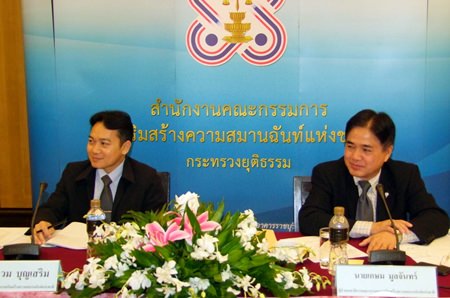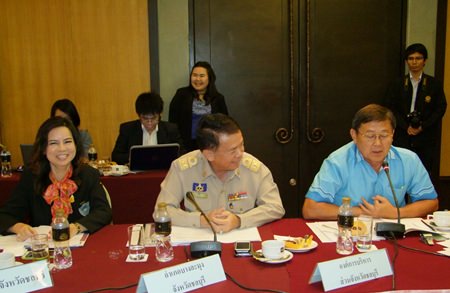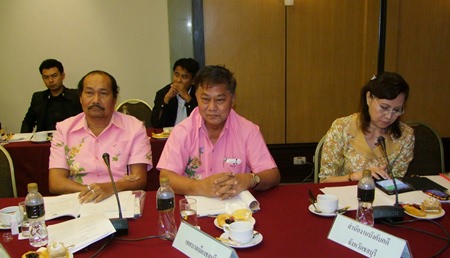With both red- and yellow-shirted camps sidelined by May’s military coup, Justice Ministry officials met in Chonburi to plan reconciliation at the community level.
Kasem Munjan, deputy director-general of the Department of Probation, led a June 13 meeting to develop strategies for reconciliation at the Tide Resort in Bangsaen.
 Kasem Munjan, deputy director-general of the Department of Probation, leads a June 13 meeting to develop strategies for reconciliation at the Tide Resort in Bangsaen.
Kasem Munjan, deputy director-general of the Department of Probation, leads a June 13 meeting to develop strategies for reconciliation at the Tide Resort in Bangsaen.
The National Reconciliation Commission and Office of the Permanent Secretary at the Ministry of Justice held the meeting to lay out directions for reconciliation in community level; to listen to opinions and suggestions; to provide knowledge and skills needed in promoting unity; to exchange views regarding the conflicts among Thai people and how to address them; and to gather information for developing the justice system that would bring unity to Thai society.
Kasem said that Thai society is continuously changing due to globalization. The rapid changes have brought Thai people conflicts either through politics, economy, culture, or other factors. The longer the conflicts remain the wider level they spread; from individuals to families to communities and to the national level.
There are several different types of conflicts, he said. “Information Conflicts” are caused by either too much information or too little, distortion of information and simple miscommunication.
“Conflicts over benefits” are based on the inherent desire of humans to compete for benefits. “Relationship conflicts” are mainly due to differences of personality, character or points of view. “Value conflicts” erupt when people have different values due to their beliefs, family background, or culture. “Structure conflicts” are caused by forces external to the people in dispute or factors that are rarely in the control of the individuals involved in the conflict, such as political influences, he said.
Therefore the National Reconciliation Commission is meeting with various communities to exchange knowledge and points of view conducive to reconciliation and peace in Thai society.






